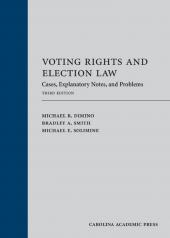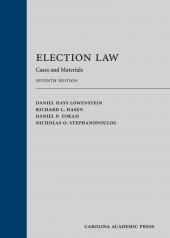Voting Rights and Election Law: Cases, Explanatory Notes, and Problems
Select subscription type
Terms & conditions
Subscribers receive the product(s) listed on the Order Form and any Updates made available during the annual subscription period. Shipping and handling fees are not included in the annual price.
Subscribers are advised of the number of Updates that were made to the particular publication the prior year. The number of Updates may vary due to developments in the law and other publishing issues, but subscribers may use this as a rough estimate of future shipments. Subscribers may call Customer Support at 800-833-9844 for additional information.
Subscribers may cancel this subscription by: calling Customer Support at 800-833-9844; emailing customer.support@lexisnexis.com; or returning the invoice marked "CANCEL".
If subscribers cancel within 30 days after the product is ordered or received and return the product at their expense, then they will receive a full credit of the price for the annual subscription.
If subscribers cancel between 31 and 60 days after the invoice date and return the product at their expense, then they will receive a 5/6th credit of the price for the annual subscription. No credit will be given for cancellations more than 60 days after the invoice date. To receive any credit, subscriber must return all product(s) shipped during the year at their expense within the applicable cancellation period listed above.
Subscribers receive the product(s) listed on the Order Form and any Updates made available during the annual subscription period. Shipping and handling fees are not included in the annual price.
Subscribers are advised of the number of Updates that were made to the particular publication the prior year. The number of Updates may vary due to developments in the law and other publishing issues, but subscribers may use this as a rough estimate of future shipments. Subscribers may call Customer Support at 800-833-9844 for additional information.
Subscribers may cancel this subscription by: calling Customer Support at 800-833-9844; emailing customer.support@lexisnexis.com; or returning the invoice marked 'CANCEL'.
If subscribers cancel within 30 days after the product is ordered or received and return the product at their expense, then they will receive a full credit of the price for the annual subscription.
If subscribers cancel between 31 and 60 days after the invoice date and return the product at their expense, then they will receive a 5/6th credit of the price for the annual subscription. No credit will be given for cancellations more than 60 days after the invoice date. To receive any credit, subscriber must return all product(s) shipped during the year at their expense within the applicable cancellation period listed above.
Product description
View a sample of this title using the ReadNow feature
To purchase a printed version of this title, please visit www.caplaw.com.
Voting Rights and Election Law is a teachable, yet sophisticated, casebook that takes readers through the law of the political process, from the right to vote through the tabulation (and re-tabulation) of votes. Along the way, the book explores and explains the law of districting (including gerrymandering and the one-person, one-vote doctrine); the Voting Rights Act; ballot access and ballot design; free-speech rights of candidates, parties, and ordinary citizens; campaign finance; and the election administration.
This book presents the law of politics in a thorough but understandable way that approaches election law primarily as law rather than as an exercise in political theory. Narrative introductions and notes clearly set forth and explain the law, and cases are edited to allow students to appreciate judicial reasoning by reading the courts’ own words. Compared to other casebooks in the field, Voting Rights and Election Law emphasizes the text of leading court opinions rather than commentary and competing political theories about elections and democracy. Students are, however, encouraged through notes and questions to examine and to question the empirical assumptions and theoretical premises behind the opinions, paying particular attention to the proper role for the courts in policing politics. Frequent problems give students and instructors an opportunity to examine how the principles of election law should be applied to realistic situations—reinforcing that election law is not merely a subject of historical or theoretical interest but one that shapes political outcomes year after year.
The third edition is the product of a comprehensive review, update, and streamlining of the second. The third edition presents more material more efficiently, and as a result the third edition is both more thorough in its coverage and clearer in its explanations, while being slightly shorter than the second edition. The book's organization has been rethought and adjusted to make the presentation more effective. The materials on the political-question doctrine have been revised to account for the increased attention that has been given to partisan gerrymanding and to the use of independent districting commissions. Material on congressional power to enact the original Voting Rights Act of 1965 has been moved from Chapter 1 to Chapter 3, where it joins the (slimmed-down) coverage of preclearance, which has declined in significance after Shelby County v. Holder.
The coverage of third parties and ballot access now joins the term-limits material to form a new Chapter 6 that fully considers states’ power to design, and to control access to, the ballot. The examination of the protection for anonymous speech has been combined with the materials on campaign-finance disclosure rules to form a new Chapter 9 that comprehensively considers the tradeoffs between disclosure and anonymity. The coverage of election administration has been thoroughly redesigned to cover all manner of election-day rules in a single chapter that includes examination of legal questions that have arisen as states have adjusted their election laws to account for the COVID-19 pandemic.
This new structure also allows the book to devote attention to the electoral college and to other federal rules that affect the casting and counting of votes, even as elections are administered by state and local officials.
This book also is available in a heavily discounted, three-hole punched, alternative loose-leaf version printed on 8 ½ x 11 inch paper with wider margins and with the same pagination as the hardbound book.
epub is protected by Adobe DRM.
eBooks, CDs, downloadable content, and software purchases are noncancelable, nonrefundable and nonreturnable. Click here for more information about LexisNexis eBooks. The eBook versions of this title may feature links to Lexis+® for further legal research options. A valid subscription to Lexis+® is required to access this content.
Table of contents
Chapter 1 VOTING QULIFICATIONS
Chapter 2 POLITICAL QUESTIONS
Chapter 3 ONE PERSON, ONE VOTE
Chapter 4 PRECLEARANCE UNDER SECTION 5 OF THE VOTING RIGHTS ACT
Chapter 5 DISTRICTING BY RACE
Chapter 6 THE ROLES AND RIGHTS OF POLITICAL PARTIES
Chapter 7 TERM LIMITS
Chapter 8 POLITICAL SPEECH
Chapter 9 CAMPAIGN FINANCE
Chapter 10 AT THE POLLS
Chapter 11 COUNTING THE VOTES
Chapter 12 REMEDYING ERRORS IN ELECTIONS
Table of Cases Table of Authorities
Index
 Lexis Nexis
Lexis Nexis 

